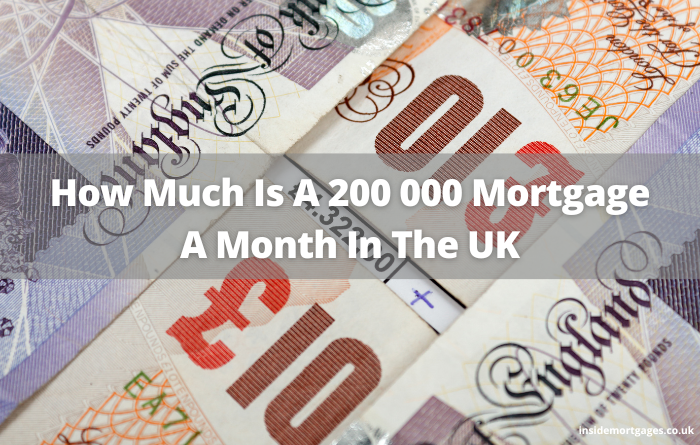How Much Is A 200 000 Mortgage A Month In The UK
The monthly payment on a £200,000 mortgage in the UK will depend on a variety of factors, such as the interest rate, loan term, and type of mortgage. For example, for a 25-year repayment mortgage with an interest rate of 3%, the monthly payment would be around £948. However, if the interest rate is higher, for example, at 4%, the monthly payment would increase to around £1,054. It’s important to note that this is just an estimate and your actual monthly payment may vary based on your individual circumstances and the specific terms of your mortgage agreement.
What Is A Mortgage?
A mortgage is a type of loan that is used to purchase a property, such as a house or a flat. It is typically a long-term loan that is repaid over a period of several years, often up to 25 or 30 years. When you take out a mortgage, you are essentially borrowing money from a lender, such as a bank or a building society, to buy a property.
Why Is It Important To Understand How Much You Will Be Paying For Your Mortgage Each Month?
Understanding how much you’ll be paying each month is important because it helps you to budget and plan your finances. Your monthly mortgage payment will typically be your largest monthly expense, so it’s important to know how much it will be so that you can ensure you have enough money to cover it each month.
In addition, understanding how much you’ll be paying each month can help you to determine how much you can afford to borrow and what type of property you can realistically afford to buy. By looking at different mortgage options and calculating how much you’ll need to pay each month for each option, you can make a more informed decision about what type of mortgage and property is right for you.
£200,000 Mortgage Breakdown

When buying a property in the UK, it’s common to take out a mortgage to finance the purchase. A £200,000 mortgage is a significant amount of money that can be used to buy a range of properties, depending on the location and the type of property. However, the amount you’ll pay each month for your mortgage will depend on a variety of factors.
Some of the factors that will affect the monthly payment for a £200,000 mortgage include the interest rate, the loan term, the type of mortgage, and the lender’s fees. Understanding how these factors can impact your monthly payment is essential when determining how much you can afford to borrow and what type of property you can realistically afford to buy.
Factors that Affect Mortgage Payments
There are several factors that can affect mortgage payments, including:
- Interest rate: The interest rate is the percentage of the loan amount that you’ll pay in interest each year. The higher the interest rate, the more you’ll pay each month for your mortgage.
- Loan term: The loan term is the length of time over which you’ll repay your mortgage. A longer loan term will typically result in lower monthly payments, but you’ll end up paying more in interest over the life of the loan.
- Type of mortgage: There are several types of mortgages available, including fixed-rate mortgages, variable-rate mortgages, and interest-only mortgages. Each type of mortgage has its own advantages and disadvantages, and the type you choose will affect your monthly payment.
- Lender’s fees: Lenders may charge fees for processing your mortgage application, such as arrangement fees or valuation fees. These fees can add to the overall cost of your mortgage and may affect your monthly payment.
Understanding how these factors can impact your monthly payment is important when determining how much you can afford to borrow and what type of mortgage is right for you. By considering each of these factors and working with a mortgage advisor, you can make an informed decision about what type of mortgage to choose and how much you can realistically afford to pay each month.
Example Mortgage Payment Variations
As above, the interest rate, type of mortage and length of repayment term that you take out will impact how much you repay in the long run. Here are some hypothetical scenarios to illustrate how different interest rates and loan terms can affect the monthly payment for a £200,000 mortgage in the UK:
Scenario 1: Fixed-rate mortgage with a 2% interest rate over 25 years
- Monthly payment: £845
- Total interest paid over the life of the loan: £52,425
Scenario 2: Variable-rate mortgage with a starting interest rate of 2.5% over 25 years
- Monthly payment: £885
- Total interest paid over the life of the loan: £62,424
Scenario 3: Fixed-rate mortgage with a 3% interest rate over 20 years
- Monthly payment: £1,111
- Total interest paid over the life of the loan: £66,440
Scenario 4: Interest-only mortgage with a 4% interest rate over 25 years
- Monthly payment (interest only): £666
- Total interest paid over the life of the loan: £100,000 (with the original loan balance still outstanding at the end of the term)
As you can see, the interest rate and loan term can have a significant impact on the monthly payment and total interest paid over the life of the loan. In general, a lower interest rate or shorter loan term will result in a lower monthly payment, but may result in higher total interest paid.
Conversely, a higher interest rate or longer loan term will result in a higher monthly payment, but may result in lower total interest paid. It’s important to consider all of these factors when choosing a mortgage and determining how much you can realistically afford to pay each month.
Other Costs to Consider When Purchasing A Home
When purchasing a home, it’s important to remember that the monthly mortgage payment is just one of several costs that you’ll need to consider. Here are some other costs to keep in mind:
- Council Tax: Council Tax is paid to local authorities and are based on the value of the property. These taxes can add up to a significant amount each year and should be factored into your overall budget. They can range from £80-£150 a month depending on the area and band that your home falls into, so it pays to check what your local council charges for the home you’re looking to purchase.
- Mortgage Insurance: Mortgage insurance, also known as mortgage life insurance or mortgage protection, is an insurance policy that covers the lender in case you fail to make your mortgage payments. In some cases this may be required by the lender if you have a smaller down payment or if your credit score is not high enough. This can add several hundred pounds each year to your loan costs, so it’s important to factor this into your overall budget.
- Maintenance & Repair Costs: It’s also important to consider the ongoing costs of maintaining and repairing your home. These can range from replacing appliances to painting or remodelling, so it pays to have an emergency fund or savings set aside for these types of expenses.
- Stamp Duty: Stamp duty is a tax levied on all property purchases in the UK over £125,000. The amount of stamp duty you’ll have to pay depends on the value of the property, and can range from a few hundred pounds up to several thousand.
- Homeowners insurance: Homeowners insurance is designed to protect your property and belongings in the event of damage or theft. The cost of this insurance can vary based on the location, condition of the property and level of cover selected. Adding in emergency call out cover, legal fee protection or additional items may raise the cost of the premium paid.
- Closing costs: When purchasing a home, you’ll be responsible for paying a variety of closing costs, including appraisal fees, title fees, and legal fees. These costs can add up quickly and should be factored into your overall budget.
When determining how much you can afford to pay each month for your mortgage, it’s important to consider all of these additional costs. Failure to factor in these costs can result in financial strain down the line. By creating a comprehensive budget that takes into account all of these expenses, you can ensure that you’re financially prepared to become a homeowner.
Where To Find Home Purchase Budgeting Plans

If you’re interested in creating a budget for your home purchase, there are a variety of resources available to help. Your lender may provide worksheets or calculators that can provide insight into the costs associated with purchasing a home and what type of loan best fits your needs. Additionally, many lenders also offer online financial planning classes or seminars that can help you create a budget and plan for your future. Finally, there are also numerous websites and apps that specialize in helping home buyers develop a budget and manage their finances, such as moneysavingexpert.
What Salary Would I Need To Afford A £200,000 Mortgage?
There is no set rule for the salary you need for specific mortgages as your ability to secure a mortgage of any amount is entirely dependent on the lenders decision and approval criteria. Some will have lower requirements than others, whereas some will be incredibly strict.
Saying that, as a general rule of thumb, your mortgage payment (including principal and interest) should not exceed 28% of your gross monthly income. Therefore, assuming a 25-year loan term and a 3% interest rate, the monthly mortgage payment on a £200,000 mortgage would be approximately £948. To afford this monthly payment, you would need a gross annual income of approximately £40,700.
It’s important to keep in mind that this is a rough estimate and that other expenses, such as property taxes and homeowners insurance, will also need to be factored in. Additionally, your lender may have their own criteria for determining how much you can borrow based on your income and other factors.
Therefore, it’s a good idea to speak with a mortgage advisor to get a better understanding of what salary you would need to afford a £200,000 mortgage based on your unique financial situation.
What Other Factors Do Mortgage Lenders Consider Other Than Salary?
Mortgage lenders consider several factors other than salary when determining whether to approve a mortgage application and how much to lend. Here are some of the most important factors:
- Credit score: Your credit score is a measure of your creditworthiness and indicates how likely you are to repay your debts. Mortgage lenders will typically look for a credit score of 620 or higher, although some lenders may require a higher score.
- Debt-to-income ratio: Your debt-to-income ratio is a measure of your monthly debt payments compared to your monthly income. Lenders typically prefer a debt-to-income ratio of no more than 43%.
- Employment history: Lenders will want to see that you have a stable employment history and steady income. They may ask for documentation such as pay stubs and employment contracts.
- Deposit Payment: The deposit is the amount of money you put down upfront when purchasing a home. Lenders typically prefer a down payment of at least 20% of the purchase price, although some lenders may accept a smaller amount.
- Property value and condition: Lenders will consider the value and condition of the property you’re purchasing to ensure that it’s a sound investment.
- Other financial assets: Lenders may also consider other financial assets you have, such as savings accounts or investment portfolios.
By considering all of these factors, mortgage lenders can get a better understanding of your financial situation and determine whether you’re a good candidate for a mortgage. It’s important to keep these factors in mind and take steps to improve your credit score and financial position before applying for a mortgage.
Even if you don’t score highly on all of the points above, there are plenty of mortgage brokers that can assist you in finding the right lender to approach based on your specific financial circumstances.
Summary
In summary, purchasing a home can be a significant financial commitment, and it’s important to understand how much you can afford to pay each month. A £200,000 mortgage in the UK can come with a variety of monthly payments depending on the interest rate and loan term.
Additionally, it’s important to factor in other costs such as property taxes, insurance, and maintenance costs when determining how much you can afford to pay each month. Mortgage lenders also consider several factors other than salary when determining whether to approve a mortgage application and how much to lend. By understanding these factors and creating a comprehensive budget, you can make a more informed decision about purchasing a home that fits your financial situation.

